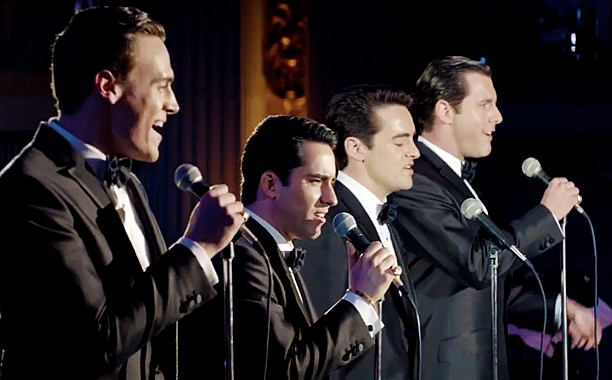“That’s a nice colour for you,” smiles Frankie Valli at his wife-to-be, “you should always wear that.” If you tune your ear just right, you can hear the Eastwood detractors’ pencils sharpening. With Jersey Boys, his thirty-third feature film as director, he has made a Clint Eastwood movie, and it’s a fool that takes that for a bad thing. In that unmistakeable piano-tinkling and the underlit aesthetic that thrives in the shadows, there is the authorial mark of a master filmmaker at work. Back at the helm for the first time since 2011’s J. Edgar —those thirty-one months are the longest gap yet in his career— he has reaffirmed his pole position in mainstream American cinema, and all without amending his approach an iota.
Though that’s not strictly true, if we’re keeping tabs, and already unsaid in much coverage of the movie is the milestone it represents as the director’s digital debut. Those detractors might find themselves agreeable anew: free of the textural richness of celluloid’s shadows, the dark aesthetic Eastwood and longtime DP Tom Stern have cultivated is forced here to brighten up a
little, a fitting refreshment for a film that could use the levity. Indeed it’s a blinding sky on which the movie opens, craning down to a suburban New Jersey street and a cheeky grin on the face of Tommy DeVito, who sets the ball swiftly rolling with his direct camera address, a lively conceit held over from the hit Broadway source.
Given the script’s been penned by the musical’s book, that’s no great shock: Rick Elice and Marshall Brickman—he of Annie Hall and Manhattan—serve their own source as well as they do this derivative, expanding on the action possibilities afforded by the screen while conceding to change up the order of things as needs be. With its cherry-picked aspects from genres aplenty, it’s an ideal outlet for the versatile Eastwood, who mounts equally well an early car crash set piece and the trace amounts of gangsterdom Christopher Walken’s peripheral Don drags in. Above all, though, it’s a comedy at heart, and Eastwood embraces the opportunity to let loose: it’s not since Space Cowboys he’s had so much fun with a film; after a slyest of self-deprecating gags, especially, we’re right there with him.
Alas, it’s not all fun and games, and in hitting on the more obvious dramatic beats the movie can’t but lose a little of its steam. Biopic or no, Valli’s family dissolution manifests itself more a matter of course than a legitimately-felt domestic collapse; perhaps it’s his exploration of those very issues in Bird that leave Eastwood seemingly uninterested in stepping beyond the front door. Still, stage holdover John Lloyd Young mines the material for all it’s worth, and as much as his dramatic crescendo may crumble, he’s an actor affecting enough to make the most. Ditto Boardwalk Empire breakthrough Vincent Piazza, who steals scenes in swathes as the quick-to-anger DeVito; here is a man with a ferocity to frighten Joe Pesci—literally, in a hilarious handful of sequences.
Walken and Piazza are but two of few among the primary cast who haven’t come straight from the stage; the former’s fondness for a dance shows well what’s caught Clint’s eye here. Jersey Boys is a jukebox musical very much in the classical Hollywood vein, and here is a helmer to give it the treatment to suit. Whether digitally craning up the face of the record label’s HQ or tipping his hat to the rear projection techniques of old, Eastwood has made a well-integrated toe-tapper that’s just as aware of how out of date it might seem as the octogenarian himself. It’s a nifty little feature of the rotating, retrospective narration to note that you’ll always shift the story to suit your side best. At this point in life, Eastwood knows his well.

